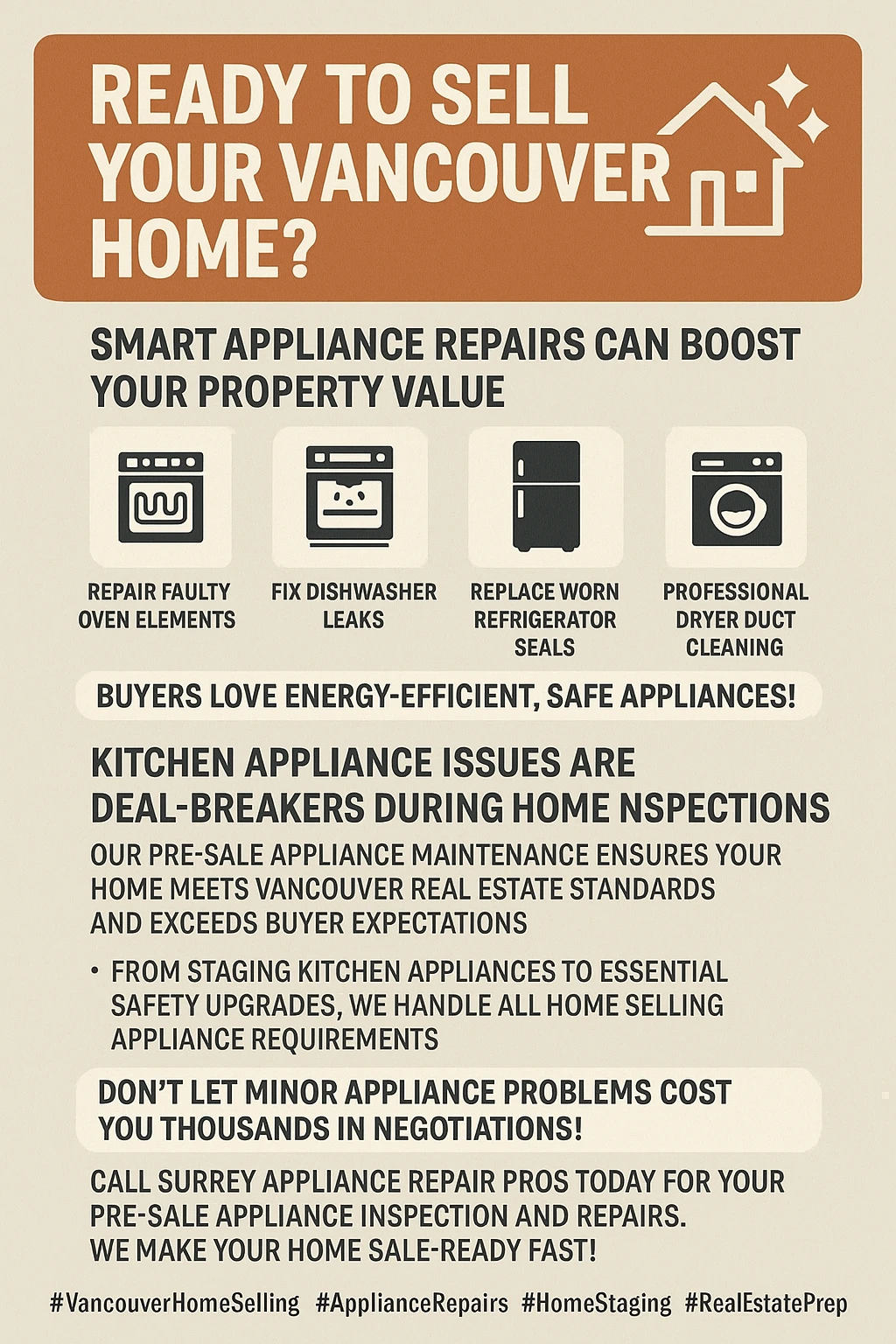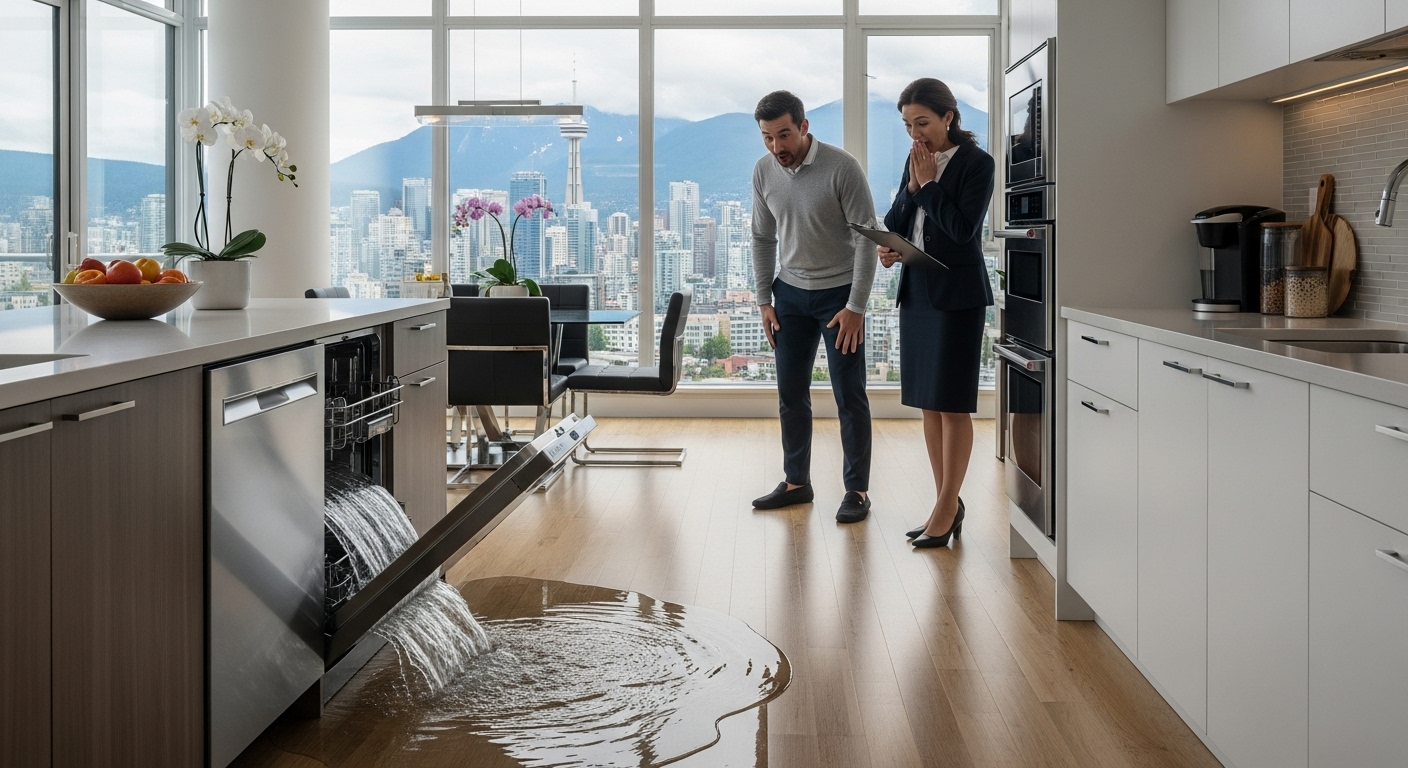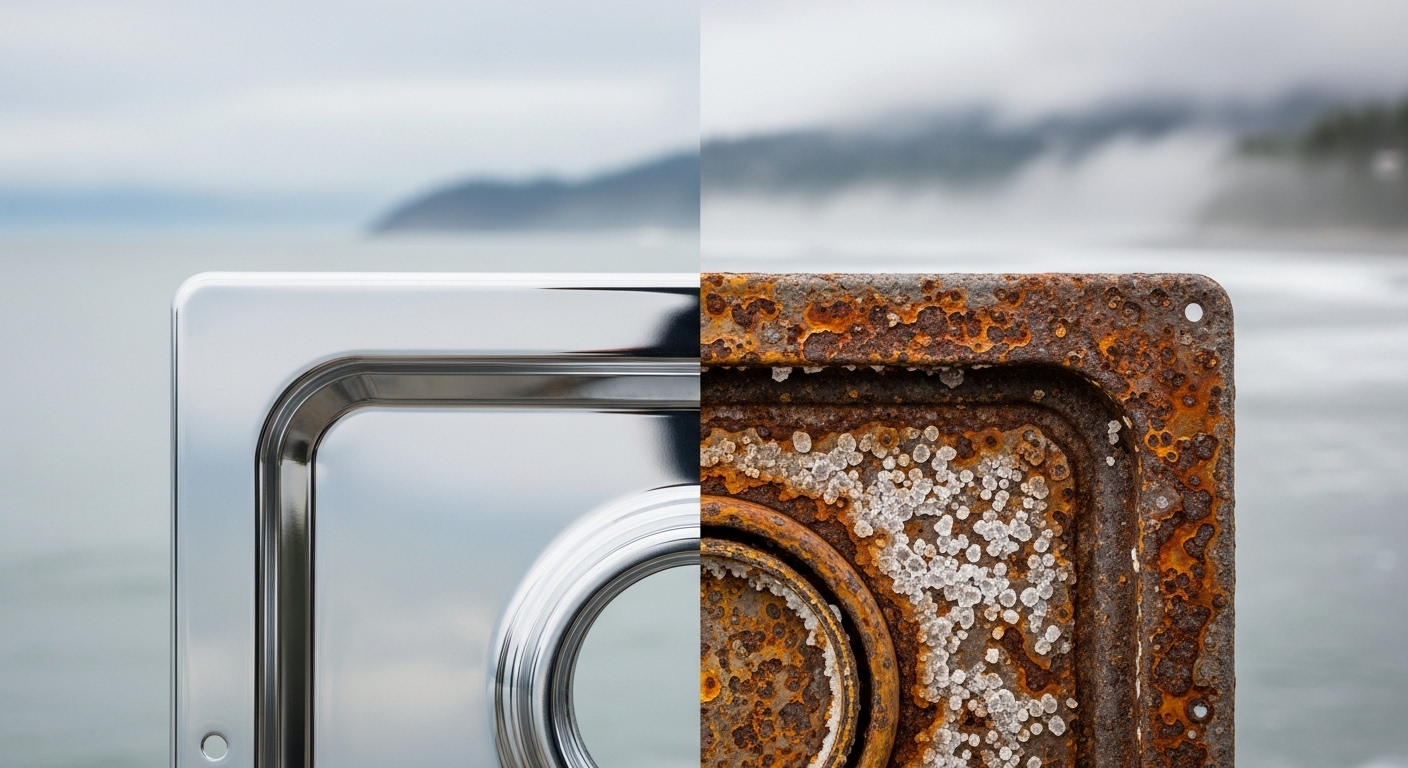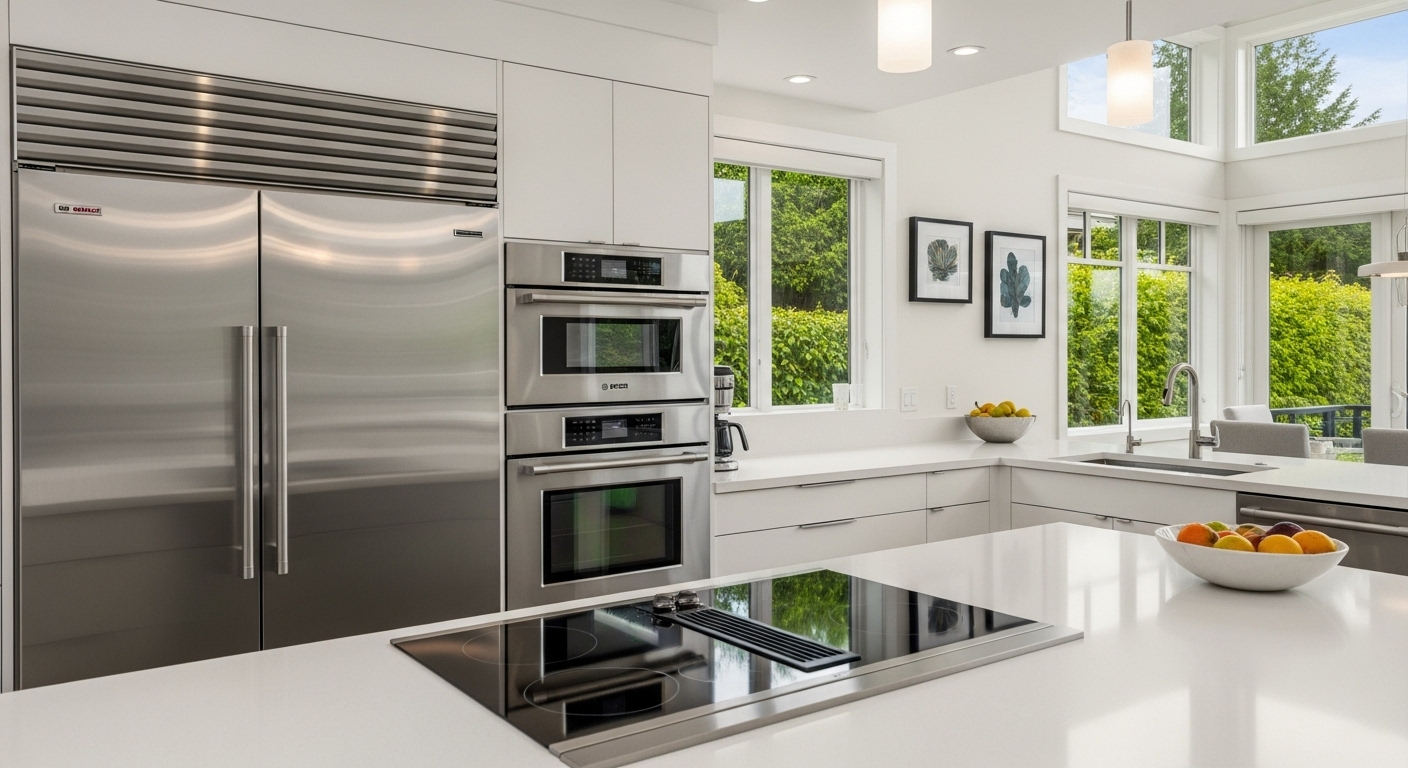Thinking about listing your Vancouver property but worried about appliance breakdowns during those crucial buyer showings? You’re about to discover how a proactive appliance strategy can literally add tens of thousands to your final sale price while protecting you from costly surprises that derail negotiations.
Picture this scenario that plays out weekly across Vancouver: you’ve spent $3,000 staging your Coal Harbour condo to perfection, complete with designer furniture and that magazine-worthy kitchen setup. Your listing photos are gorgeous, and you’re already getting showing requests within hours. Then during the first weekend open house, your dishwasher decides to leak all over the hardwood floors while a potential buyer’s agent is demonstrating the kitchen’s “gourmet capabilities” to their clients. Game over – or at least game severely compromised.
This nightmare scenario isn’t some rare occurrence in Vancouver’s red-hot real estate market. Our coastal climate creates the perfect storm for appliance failures, with the combination of salt air, humidity, and temperature fluctuations reducing appliance lifespans by 20-30% compared to inland properties. When you factor in Vancouver’s average of 25-50 showings per staged property and typical sale timelines of 36 days, your appliances are essentially in performance mode for over a month straight. They need to work flawlessly under conditions they were never designed to handle.
Here’s the thing that most Vancouver homeowners don’t realize: in a market where the average home sells for $1,226,351 and buyers regularly face multiple offer situations, every single detail becomes a competitive advantage. Your appliances aren’t just functional necessities anymore – they’re legitimate value drivers that can make or break your sale. We’re talking about strategic investments that, when properly maintained and thoughtfully upgraded, can deliver returns that genuinely surprise sellers in the best possible way.
Key Outtakes:
- Vancouver’s coastal climate reduces appliance lifespan by 20-30% compared to inland properties, making pre-sale inspections crucial for preventing costly surprises during the critical selling period
- Kitchen appliance upgrades can increase Vancouver home values by 3-7%, translating to $36,790-$85,844 on the city’s average home price of $1,226,351
- Emergency appliance repairs during active listings cost $500-800 before parts, while preventive pre-sale inspections cost only $200-400
- Stainless steel kitchen appliance packages provide 141% return on investment, with new appliances costing $4,229 and adding $5,982 in value
- Professional dryer vent cleaning prevents the leading cause of 2,900 annual home fires while improving energy efficiency and demonstrating proper maintenance to buyers

Vancouver’s Coastal Climate: Your Appliances’ Secret Enemy

Before we dive into specific repair strategies, we need to understand why Vancouver properties face unique appliance challenges that directly impact resale value. Our beautiful coastal location creates environmental conditions that most generic home selling advice completely ignores, and understanding these factors is crucial for making smart pre-sale investment decisions.
The marine environment surrounding Vancouver creates what appliance technicians call “accelerated aging conditions” for home equipment. High humidity, salt air, and frequent temperature fluctuations don’t just make appliances work harder – they fundamentally change how components deteriorate. Metal elements corrode faster, seals become brittle more quickly, and electronic components suffer from moisture-related failures that rarely occur in drier climates.
This isn’t just theoretical concern – it translates into real dollars and cents for Vancouver homeowners. Appliances in our coastal environment typically require replacement or major repairs 2-3 years earlier than the same models in places like Calgary or Edmonton. When you’re preparing to sell, this means appliances that might seem “fine” to you could already be showing early warning signs that savvy buyers and their inspectors will definitely notice.
The high-rise condo market adds another layer of complexity that many sellers overlook. Vancouver’s incredibly tight rental market means that many condos have been rental properties at some point, and rental usage patterns create different wear patterns than owner-occupied homes. Tenants often use appliances more intensively and may not report minor issues promptly, leading to problems that compound over time.
Here’s where it gets really interesting from a legal perspective: British Columbia’s Property Condition Disclosure Statement requires sellers to disclose known appliance defects. This means that once you become aware of an appliance problem – even a minor one – you’re legally obligated to report it to potential buyers. This disclosure requirement makes proactive appliance inspection not just good strategy, but legal necessity for protecting yourself from potential liability issues down the road.
Strategic Appliance Repairs That Maximize Vancouver ROI

Now that we understand Vancouver’s unique challenges, let’s talk about where to focus your pre-sale appliance investment for maximum return. Not all appliance improvements are created equal, and in our competitive market, strategic thinking can literally translate to tens of thousands of dollars in your final sale price.
Kitchen appliances consistently deliver the highest return on investment because they stay with the home and serve as focal points that buyers see and interact with during every single showing. Research specific to Vancouver’s market shows that kitchen appliance upgrades can increase home values by 3-7%, which on our average home price translates to $36,790 to $85,844 in added value. That’s not monopoly money – that’s a significant chunk of real equity.
The brand selection strategy becomes crucial when you understand how different manufacturers impact buyer perception. Data shows that Bosch appliances increased home value per square foot by an astounding 132%, while Samsung appliances added 24.1% per square foot value. Meanwhile, GE appliances, despite being most commonly mentioned in listings, actually correlated with reduced home prices by 3.9%. The takeaway is clear: brand perception matters enormously, and buyers are willing to pay premiums for brands they associate with quality and reliability.
Energy efficiency features deserve special attention in Vancouver’s market. Energy-efficient appliances topped value charts at 11.6% per square foot – the highest among all appliance features. This aligns perfectly with Vancouver’s environmental consciousness and our relatively high energy costs through BC Hydro. When buyers see ENERGY STAR ratings and modern efficiency features, they’re not just seeing lower utility bills – they’re seeing alignment with their values and lifestyle expectations.
The age threshold for appliance replacement creates a strategic decision point that many sellers miss. Appliances over 10-15 years old may negatively impact value regardless of their current condition, simply because buyers associate age with potential reliability issues and energy inefficiency. This creates a sweet spot where replacing marginally functioning older appliances can provide outsized returns because you’re not just fixing problems – you’re eliminating buyer concerns about future problems.
Laundry appliances present a different calculation entirely. While important for functionality, they only stay with homes about half the time and don’t provide the same visual impact as kitchen appliances. However, in Vancouver’s climate, washer and dryer maintenance becomes critical because front-loading washers are particularly vulnerable to mold growth in our humid environment, and dryer vent blockages create both safety and efficiency issues that buyers definitely notice during inspections.
Pre-Sale Appliance Inspection Checklist for Vancouver Properties

A systematic inspection approach protects your investment and prevents those nightmare scenarios where appliances fail during crucial buyer showings. Vancouver’s coastal environment requires special attention to specific vulnerabilities that might not be obvious during casual daily use, and professional inspection can identify issues before they become expensive problems.
Kitchen appliance evaluation should start with range and oven temperature calibration verification. Variations of more than 25 degrees from set temperatures indicate internal problems that experienced buyers and their agents will notice immediately. The simple paper towel method works perfectly for dishwasher leak detection – place paper towels around the base and run a complete cycle, checking for any moisture that might indicate seal problems or loose connections that will definitely show up during buyer demonstrations.
Refrigerator assessment goes beyond simple cooling function testing. Ice maker operation, consistent temperatures across compartments, and unusual noises all provide clues about compressor health and overall reliability. Door seals deserve particular attention in Vancouver’s humid climate, where poor seals allow moisture infiltration that forces units to work harder and increases energy costs – something that energy-conscious buyers definitely factor into their value calculations.

